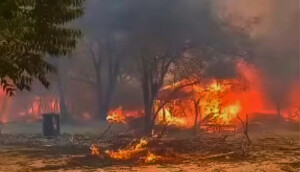West Darfur clashes: 100 dead, 15,600 displaced
At least 100 people have now died and more than 15,600 people (2,600 families) are displaced to Saraf Omra locality in North Darfur after fleeing ongoing tribal clashes in Kulbus locality in West Darfur over the past week.
 A displaced family in Darfur (File photo: OCHA)
A displaced family in Darfur (File photo: OCHA)
At least 100 people have now died and more than 15,600 people (2,600 families) are displaced to Saraf Omra locality in North Darfur after fleeing ongoing tribal clashes in Kulbus locality in West Darfur over the past week.
The Humanitarian Aid Commission (HAC) in Saraf Omra locality in North Darfur says that about 2,600 families (15,600 individuals) have been displaced to Saraf Omra city as a result of the attacks on villages in Kulbus locality in West Darfur, that spilled over into North Darfur.
The conflict erupted following a dispute over land ownership between a Gimir man, a non-Arab African tribe, and a Rizeigat man, an Arab herding tribe.
In an interview with Radio Dabanga, Saddam Ishaq Ahmed, Commissioner for Humanitarian Aid, said that the displaced people came from 30 villages, most of them from north of Saraf Omra and two from Kulbus locality in West Darfur.
He pointed out that the displaced are living in dire conditions in Saraf Omra, scattered among the homes of their relatives in six neighbourhoods of the city, next to the villages of Um Jarwa and Jabek Allah in El Sareif locality.
Ahmed explained that the displaced include a large number of children, nursing mothers, and pregnant women. He says that many children are suffering from diarrhoea, and called on foreign and national organisations to intervene urgently and provide the displaced with shelter materials, food, and non-food items.
The United Nations said that the number of victims of the militia attack on several villages in Kulbus, West Darfur state, has risen to about 100 dead and confirmed that thousands of displaced people who crossed to neighbouring localities.
In a tweet, Toby Harward, UN refugee agency (UNHCR) Principal Situation Coordinator for Darfur, stressed the urgent need for impartial joint forces to stop violence, protect civilians and restore the rule of law.
He also stressed the need to investigate the incidents and bring to justice the militia members responsible for killing people, burning villages, and displacing the local population. He called on neutral and respected community leaders to start efforts for dialogue and social cohesion. He warned that the continuation of violence would lead to the failure of the agricultural season, which would lead to catastrophic conditions.
The Special Representative of the UN Secretary-General (SRSG) for Sudan and head of the United Nations Integrated Transition Assistance Mission in Sudan (UNITAMS), Volker Perthes, also took to Twitter to appeal to parties to de-escalate the violence.
“Appalled, again, by the violence in Kulbus, West Darfur, with so many deaths. The cycle of violence in Darfur is unacceptable and highlights root causes that must be addressed. I call on community leaders, authorities, armed groups to de-escalate and ensure protection of civilians,” Perthes says.
The Higher Coordination of Nomads in West Darfur said that the clashes occurred after the killing of one of the nomads and the injury of another in a shooting in the area of Um Hariz in Kulbus locality.
In a statement after the initial clashes last week, the Nomads Coordination said that the perpetrators were pursued which led to clashes that left a number of dead and wounded.
Darfur violence
Darfur has a long history of strife between Arab herding tribes and non-Arab African herders or sedentary farmers. Arab tribesmen were recruited by the previous regime of dictator Omar Al Bashir to join the Janjaweed militias. Al Bashir employed these Arab militias to repress a revolt over ethnic marginalisation in the region, mainly targeting non-Arab African farmers. During the war that followed, at least 300,000 people were killed and over 2.5 million were displaced according to the UN.











 and then
and then